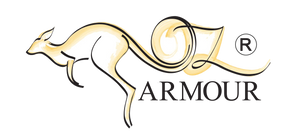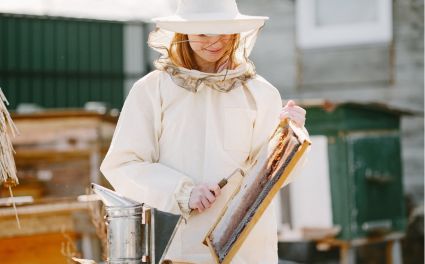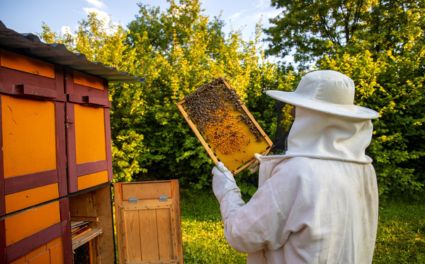Queen bees are the cornerstone of every successful hive, playing a crucial role in maintaining colony strength, reproduction, and productivity. Whether you are a beginner or an experienced beekeeper, buying queen bees is a significant step that directly impacts hive performance. Understanding how to select, evaluate, and introduce queens is essential for sustaining a healthy and thriving colony. This guide provides detailed tips for purchasing queen bees, ensuring your beekeeping journey continues with confidence and success.
Why Buying Queen Bees Is Essential
Purchasing new queen bees is vital to rejuvenating hive genetics and enhancing overall productivity. A well-selected queen contributes to honey bees that are more resilient, calm, and productive. Her genetic traits influence every aspect of the hive—from honey yield to disease resistance.
Ensuring Hive Productivity
A healthy queen lays thousands of eggs daily during peak seasons, ensuring a constant population of worker bees that forage for nectar, build comb, and guard the hive. Her laying pattern determines the colony’s ability to produce honey efficiently and maintain strong brood cycles. Beekeepers often protect themselves during inspections using durable beekeeping suits that ensure comfort and full-body coverage.
Enhancing Bee Colony Genetics
Each queen bee passes her genetic characteristics to her offspring. By selecting queens bred for productivity, gentleness, and disease resistance, beekeepers can improve hive temperament and resilience. Strong genetics lead to improved pollination, better winter survival rates, and reduced susceptibility to pests.
Finding Reliable Queen Bee Suppliers
Purchasing from trustworthy suppliers is one of the most important steps in beekeeping. A reliable breeder ensures that queens are healthy, well-mated, and raised under hygienic conditions.
How to Identify Reputable Suppliers
Look for beekeeping suppliers with transparent breeding programs, excellent customer reviews, and verified health certifications. Responsible breeders often provide detailed information about their queens’ lineage and performance. Visiting supplier websites and forums can help gauge their reputation among the beekeeping community.
Trusted Suppliers Name
-
Lappe’s Bee Supply
-
Wildflower Meadows
-
The Bee Farm
-
The Bee Supply
Each of these names is recognized for maintaining quality breeding standards and excellent customer service.
Certifications and Quality Standards
Select breeders who follow regional beekeeping regulations and maintain strong hygiene protocols. Certified breeders often provide inspection reports that confirm their queens are disease-free. Clean, disease-free queens contribute to stronger colonies and improved productivity.
When visiting hives or meeting suppliers, safety is key. Wearing breathable beekeeping jackets and protective beekeeping gloves ensures that beekeepers stay sting-free while evaluating colonies.

Importance of Queen Bee Breeding Practices
High-quality breeding practices are the foundation of excellent queens. Reputable suppliers select queens based on traits that promote health and performance.
Selective Breeding
Suppliers such as Wildflower Meadows use selective breeding to enhance key traits—gentleness, high honey yield, and strong disease resistance. By focusing on genetic quality, these breeders ensure every queen contributes positively to the colony.
Hygiene and Maintenance
Clean breeding environments prevent the spread of harmful pathogens. The Bee Farm emphasizes strict hygiene standards and quality control to produce healthy, active queens.
Diverse Genetics
Maintaining genetic diversity is vital. Lappe’s Bee Supply and The Bee Supply focus on creating genetic variation to reduce inbreeding and promote colony resilience. Genetic diversity also helps bees adapt to local climates and forage conditions, ensuring long-term hive stability.
Selecting Queen Bees
When it comes to buying queen bees, several key factors must be evaluated to guarantee success.
Factors to Consider
-
Age: Younger queens are generally more fertile and have a longer lifespan.
-
Health: A healthy queen has a smooth, shiny abdomen and shows no signs of deformity or disease.
-
Genetic Traits: Choose queens bred for calm behavior, prolific egg-laying, and pest resistance.
High-performing queens result in calm, productive colonies that make hive management safer and easier. Using protective beekeeping veils allows for close observation of queen behavior without risking stings.
Evaluating Queen Bee Quality
Signs of a Healthy Queen Bee
A strong queen moves confidently, is surrounded by attending worker bees, and lays eggs in a consistent, dense pattern. Her abdomen should be long and symmetrical. A strong laying pattern ensures a steady worker population for pollination and honey production.
Healthy queens lead to balanced colonies with fewer swarming tendencies and better disease resistance. When inspecting frames or handling queens, protective beekeeping trousers provide comfort and protection from stings.
Impact of Queen Bee Health on Hive Performance
The hive’s growth, morale, and productivity all depend on the queen’s health. A failing or aging queen can cause disorganization and decreased honey production. Replacing her in time ensures consistent egg-laying and colony strength.
Introduction of Queen Bees to the Hive
Introducing a new queen requires patience and careful handling to ensure acceptance by the colony.
Step-by-Step Guide
-
Prepare the Hive: Ensure it’s calm, well-fed, and queenless before introduction.
-
Use a Queen Cage: Insert the new queen in a cage with a candy plug.
-
Introduce Gradually: Allow workers to interact with her through the cage.
-
Monitor Behavior: If bees feed her rather than attack, acceptance is near.
-
Release: After 3–5 days, remove the cage once the bees accept her.
Proper handling reduces rejection rates and promotes smooth transition. Wearing reinforced beekeeping ankle protection keeps bees from crawling into pant legs during introductions.
Understanding Bee Colony Genetics
Genetics determine the temperament, productivity, and disease resistance of the hive. Queen bees are the genetic core of every colony, and selecting those bred from reliable stock ensures strong future generations.
Key Genetic Traits to Prioritize
-
Disease Resistance: Colonies with hygienic traits naturally combat pests and infections.
-
High Productivity: Queens with strong egg-laying ability sustain larger worker populations.
-
Gentleness: Calm colonies make management easier and safer for beekeepers.
Educational resources such as Learn Beekeeping provide deeper insights into queen genetics and management.
Maintaining Hive Health with Queen Bees
Regular Monitoring and Replacement
Inspect your hive frequently to evaluate the queen’s performance. Keep detailed notes on egg-laying consistency and colony temperament. Replace aging queens every one to two years to maintain strong productivity.
Impact of Traits on Hive Well-Being
Queens with hygienic behavior help reduce diseases and improve hive morale. A well-mated queen minimizes swarming and ensures the smooth running of the colony.
Regular inspections are safer when wearing well-ventilated pink bee suits, especially during warmer months.
Best Beekeeping Practices for Queens
Sustainable Beekeeping Methods
Adopt environmentally friendly techniques such as using organic feeds, planting pollinator-friendly flora, and maintaining clean hives. High-quality Beekeeping Equipments help ensure efficiency and sustainability.
Long-Term Hive Success
-
Swarm Management: Split hives when overcrowded.
-
Queen Replacement: Introduce new queens proactively.
-
Education: Continuously improve your knowledge through trusted sources.
For related topics, explore Lives of Bees and articles like Do Bee Suits Protect from Wasps? to stay informed.
The Importance of Quality Protective Gear
Safe and confident beekeeping relies on dependable gear. OZ Armour designs premium protective wear that helps beekeepers handle hives safely while minimizing disturbance to bees. Lightweight beekeeping jackets and breathable suits ensure maximum comfort during hive inspections.
Proper attire reduces the risk of stings and makes hive maintenance more efficient. It also encourages calm handling, supporting colony stability during queen introductions or when removing a bee sting.

Conclusion
Buying queen bees is one of the most important decisions in beekeeping. A strong, healthy queen ensures colony productivity, good genetics, and hive harmony. Reputable suppliers like Lappe’s Bee Supply, Wildflower Meadows, The Bee Farm, and The Bee Supply are known for producing quality queens with desirable traits.
By focusing on responsible breeding practices, sustainable beekeeping, and regular monitoring, you can maintain healthy, thriving colonies. Pair these practices with protective gear from OZ Armour—including suits, veils, gloves, and trousers—for safety and efficiency.
For further insights into hive care, queen management, and other essential topics such as bumblebee vs carpenter bee, bee nest vs wasp nest, and seasonal hive preparation, visit Read More Blogs About Beekeeping.



